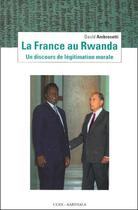Résumé:
In the prospect of the COP21 held in Paris in December 2015, the French Centre for Ethiopian Studies (CFEE) organised a scientific conference on environmental and climatic changes in the horn of Africa, with a decisive financial support of the Institut français (Fonds d'Alembert), Paris. The... Voir plus
In the prospect of the COP21 held in Paris in December 2015, the French Centre for Ethiopian Studies (CFEE) organised a scientific conference on environmental and climatic changes in the horn of Africa, with a decisive financial support of the Institut français (Fonds d'Alembert), Paris. The conference was part of a larger event, called "the Road to Paris" and organised by the French Embassy to Ethiopia and the Horn of Africa Regional Environment Centre and Network (HoA-REC&N), Addis Ababa University, in HoA-REC&N headquarters at Gullele Botanic Gardens, Addis Ababa, from 7 to 9 April 2015. In this event, our first purpose was to set aside from the pressure of short-term and policy-oriented concerns raised by the international bureaucracies and bilateral donors, as to try to explore diverse, cross-disciplinary dimensions related to environmental change in the region in a wider way, wider in time and also wider in the elements observed. In a way, the Road to Paris event has also showed, with the various stakeholders and speakers it has gathered, that the issue of climate change has "solidified" automatic discourses, supporting wishful intentions and thinking, and clearly embedded in the building of professional opportunities and international careers. These discourses, indeed, are everything but close to the reality observed on the ground. In this new, competitive, social field, priority may not be easily given to scientific exploration that is not directly policy-oriented and that requires a longer time to produce strong data than what the political and bureaucratic agendas allow. One could not state, though, that interest for science is totally absent in these arenas on climate change. But, invariably, public expectations appear to be much too high in scope and in time, compared to what intellectual curiosity and scientific processes and protocols can produce on a day-to-day basis. Improving awareness on environmental changes should start here: to give a better understanding on the complexity and multiplicity of factors involved in the relation between human evolution, societal choices and developments, and natural environments. The French Centre for Ethiopian Studies (CFEE) in Addis Ababa was quite well equipped to initiate, with its partners, such a cross-disciplinary exploration.










